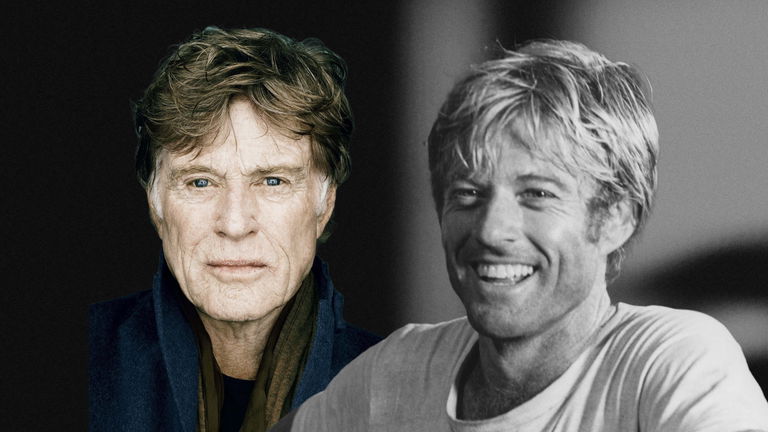Robert Redford, the man who embodied the charisma of an outlaw, the determination of a journalist, and the vulnerability of a lover, left the world as quietly as he had lived his later years.
On a serene morning, the news broke that the beloved Hollywood icon had passed away peacefully in his sleep, surrounded only by the silence of the mountains in Sundance, Utah.
There were no red carpets, no grand tributes, and no public fanfare—just the whisper of the wind across the landscape he had cherished for decades.
His departure was as understated as the man himself, a fitting end to a life marked by elegance, introspection, and quiet rebellion.
For decades, Redford had been a symbol of American cinema, captivating audiences with his piercing blue eyes and an aura that seemed to transcend the screen.
Yet he was never just a movie star. Beneath the polished exterior was a man who carried profound grief, a father who endured unspeakable loss, and an artist who grew weary of the spotlight.
His farewell to the world was not sudden—it had been unfolding for years, a slow retreat into solitude and silence.
And now, as the curtain falls on his extraordinary life, we are left not only with his cinematic legacy but with the poignant truth of a man who chose peace over applause.

A Legacy Built on Quiet Strength
Robert Redford did not emerge as a typical Hollywood heartthrob. In the 1960s, when America was fractured by war, social upheaval, and disillusionment, Redford became the face of a new kind of hero—one who reflected the complexities of the times.
His performances were subtle, layered, and deeply human. In Butch Cassidy and the Sundance Kid (1969), he portrayed an outlaw whose charm masked vulnerability.
In All the President’s Men (1976), he embodied the relentless pursuit of truth as journalist Bob Woodward. Redford’s characters were not larger-than-life; they were real, flawed, and relatable.
But his impact extended far beyond acting. As a director, Redford explored themes that Hollywood often avoided.
His Oscar-winning film Ordinary People (1980) delved into the raw pain of familial loss and emotional isolation.
It was a story that mirrored his own experiences, and Redford poured his soul into it.
He was not interested in spectacle or easy answers; his films sought to understand the human condition, to reveal the cracks beneath the surface.
Redford’s commitment to authenticity also shaped his off-screen endeavors.
In 1981, he founded the Sundance Institute, creating a haven for independent filmmakers who dared to challenge the norms of commercial cinema.
Through Sundance, he championed voices that might otherwise have been silenced, nurturing the careers of directors like Quentin Tarantino and Steven Soderbergh.
Redford’s vision was clear: art should provoke, inspire, and reflect the world in all its complexity.
A Life Marked by Loss

Behind the icon was a man who knew the depths of sorrow. Redford’s life was punctuated by tragedies that shaped his worldview and fueled his retreat from the public eye.
The death of his first child, Scott, in 1959 was a wound that never fully healed.
“No one is prepared to bury a child,” he once said, his voice heavy with grief.
Decades later, he would endure another devastating loss when his son James passed away in 2020 after battling liver disease.
These heartbreaks left an indelible mark on Redford, driving him further into the solace of nature and away from the noise of Hollywood.
His personal life was equally complex. After nearly three decades of marriage to Lola Van Wagenen, the couple divorced quietly, leaving Redford to navigate the loneliness that often accompanies fame.
Though he found love again with Sibylle Szaggars, his second wife, Redford’s heart remained heavy with the weight of his past.
He once described himself as “a tree that grows new leaves but carries old scars.”
The Retreat from Fame
Redford’s gradual withdrawal from the spotlight was not a rejection of his craft but a reclamation of his identity.
He grew disillusioned with the superficiality of modern Hollywood, where spectacle often overshadowed substance.
In interviews, he expressed frustration with the industry’s obsession with youth and commercial success.
“I don’t want people to see me fading on camera,” he said. “I’d rather leave while there’s still some magic in me.”
His final performance in The Old Man & the Gun (2018) was a fitting farewell.
Playing a charming, aging outlaw who couldn’t resist one last adventure, Redford seemed to channel his own life into the role.
After the film’s release, he announced his retirement from acting, choosing to step away from the stage he had dominated for so long.
There was no grand celebration, no farewell tour—just a quiet statement and a retreat to his ranch in Utah.
A Silent Farewell
Redford spent his final years in solitude, surrounded by the mountains and trees that had always been his sanctuary.
He painted, wrote poetry, and listened to jazz, finding solace in the simple pleasures of life.
Friends described him as a man at peace, though he rarely spoke of his inner struggles.
His wife revealed that he often read her poems by Rilke in the middle of the night, searching for meaning in the verses.
On September 16, 2025, Robert Redford passed away in his sleep.
There were no signs of distress, no dramatic final moments—just a man who had lived fully and chosen to leave quietly.
On his bedside table was a notebook with a final entry: “I’ve had a good life, but the purest beauty is always the quietest. There’s nothing more to say.”
The World Reacts
The news of Redford’s death sent ripples through Hollywood and beyond.
Tributes poured in from filmmakers, actors, and fans who mourned not only the loss of a legend but the end of an era.
Redford represented a type of stardom that no longer exists—a blend of talent, integrity, and humility that stood in stark contrast to the sensationalism of modern celebrity culture.
Social media flooded with black-and-white images of Redford, his serene smile and piercing gaze evoking nostalgia for a time when cinema was less about spectacle and more about soul.
Many reflected on his contributions to independent film, his commitment to environmental causes, and his ability to inspire without ever seeking the spotlight.
An Eternal Legacy
Robert Redford’s departure was not just the loss of a great actor—it was the end of a way of being.
He embodied a quiet strength, a refusal to conform, and a deep respect for the art of storytelling.
His films remain timeless, not because of their grandeur but because of their humanity.
They remind us of the power of subtlety, of the beauty in restraint, and of the importance of listening to the silences.
In choosing to leave the world without fanfare, Redford gave us one final lesson: true greatness does not need applause.
His legacy lives on in the directors he mentored, the actors he inspired, and the audiences who continue to find meaning in his work.
And as we remember him, perhaps we can honor his memory not with loud proclamations but with quiet reflection—just as he would have wanted.
Robert Redford may have left the stage, but his presence remains, like the whisper of the wind in Sundance, a reminder that sometimes the most profound stories are the ones told in silence.
News
💔 “SHE DIDN’T PLAN TO BE A HERO — SHE JUST COULDN’T WALK AWAY.” 🌧️ When Rachel Maddow landed in Jamaica to cover the aftermath of Hurricane Melissa, she expected devastation. What she didn’t expect… was her. A little girl, barefoot in the wreckage, clutching a soaked teddy bear and whispering one word: “Mama.” Reporters looked away. Cameras kept rolling. But Maddow — silent, trembling — stepped forward. That night, she stayed. Days later, she signed the papers that changed both their lives forever. Now, as the world reacts to her unexpected act of love, one haunting question remains: Was this journalism… or destiny?|KF
1. The Storm That Took Everything The storm had no mercy. Hurricane Melissa tore through Jamaica with winds that howled…
😱 “NO CAMERAS. NO PRESS. JUST ACTION.” 💥 When Hurricane Melissa left Jamaica in ruins, everyone expected statements — not silence. But that night, Rep. Jasmine Crockett made a call no one knew about. Hours later, a private shipment — blankets, medicine, and water filters worth $500,000 — quietly left U.S. soil. No press release. No credit. Just a note inside the first box that made rescuers burst into tears. Now, the world wants to know: what did she write?|KF
When Hurricane Melissa finally loosened its grip on Jamaica, what remained was not silence but the faint hum of survival…
💥 “THE TAPES WERE NEVER MEANT TO LEAVE THE BUILDING.” 😳 A Turning Point USA insider has come forward — and what they just leaked about Erika Kirk and the Chief of Staff is sending shockwaves through conservative media. Behind closed doors, secret recordings. Late-night meetings. Deleted emails that someone thought were gone forever. And now, the story is unraveling — faster than anyone can contain it. The insider’s confession doesn’t just expose one scandal… it hints at a network of cover-ups stretching far beyond TPUSA. 👀 Either way, the receipts are coming — and they could change everything. 👉 Full leaked details in the comments (CMT) before they disappear… 🔥👇👇|KF
Late last night, an anonymous insider from Turning Point USA (TPUSA) dropped a bombshell that has sent shockwaves through conservative…
“LIVE MELTDOWN ON NATIONAL TV” — WHOOPI GOLDBERG’S EXPLOSIVE MOMENT LEAVES ‘THE VIEW’ IN CHAOS 😱💥 It started like any other morning at The View. Laughter. Headlines. Controlled chaos. Then — a single note changed everything. As producers slipped Whoopi Goldberg a message mid-segment, cameras caught something no one was supposed to see. With a glare sharper than a knife, she snatched the paper, ripped it to pieces, and tossed it aside — live, unedited, and on national television. The studio froze. Her co-hosts went silent. Viewers at home could feel it — that thick, electric tension pulsing through the screen|KF
Inside Whoopi Goldberg’s Live Meltdown — and the Crisis Shaking Disney’s Daytime Empire It started with a folded piece of…
💥 “NO CAMERAS. NO PRESS. JUST THREE NAMES THE WORLD THOUGHT THEY KNEW.” 🌪️ When the Category-5 monster Hurricane Melissa tore through Jamaica, help was nowhere in sight. Then — without a single announcement — a private jet touched down at dawn. Inside: Rachel Maddow. Stephen Colbert. Joy Reid. No sponsors. No cameras. No entourage. They brought 5 tons of food, medicine, water filters, and $1.5 million in aid, all paid from their own pockets. Locals said they worked through the night — lifting boxes, feeding children, treating wounds — not a single word about fame or press. And when a volunteer asked why they came, Joy Reid quietly answered: “Because the news doesn’t need to cover this — humanity does.” By morning, they were gone. No selfies. No headlines. Just whispers spreading across the island — “Were those really them?” Nobody knows who leaked the flight manifest. But one thing’s certain: this wasn’t charity. This was rebellion — against the silence of comfort. 🕯🌎 👇 Full uncovered story before it disappears…|KF
No cameras. No sponsors. Just three journalists who decided to act, not speak. When Hurricane Melissa struck Jamaica — the…
End of content
No more pages to load












